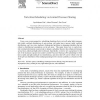Free Online Productivity Tools
i2Speak
i2Symbol
i2OCR
iTex2Img
iWeb2Print
iWeb2Shot
i2Type
iPdf2Split
iPdf2Merge
i2Bopomofo
i2Arabic
i2Style
i2Image
i2PDF
iLatex2Rtf
Sci2ools
135
click to vote
PE
2010
Springer
2010
Springer
Tail-robust scheduling via limited processor sharing
From a rare events perspective, scheduling disciplines that work well under light (exponential) tailed workload distributions do not perform well under heavy (power) tailed workload distributions, and vice-versa, leading to fundamental problems in designing schedulers that are robust to distributional assumptions on the job sizes. This paper shows how to exploit partial workload information (system load) to design a scheduler that provides robust performance across heavy-tailed and light-tailed workloads. Specifically, we derive new asymptotics for the tail of the stationary sojourn time under Limited Processor Sharing (LPS) scheduling for both heavy-tailed and light-tailed job size distributions, and show that LPS can be robust to the tail of the job size distribution if the multiprogramming level is chosen carefully as a function of the load.
Related Content
| Added | 29 Jan 2011 |
| Updated | 29 Jan 2011 |
| Type | Journal |
| Year | 2010 |
| Where | PE |
| Authors | Jayakrishnan Nair, Adam Wierman, Bert Zwart |
Comments (0)

